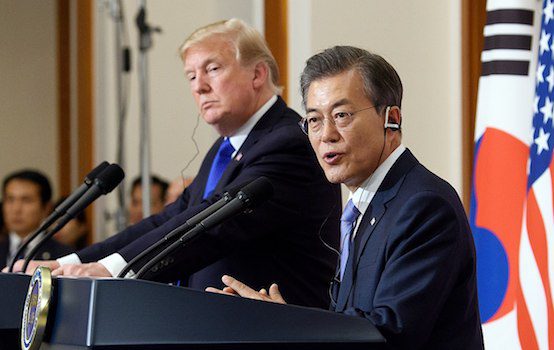Treating Allies Like Colonies

There is a growing backlash in South Korea against the U.S. ambassador there, and it is fueled in large part by frustration with the administration’s shakedown of Seoul and its mishandling of North Korea:
But unlike Lippert, Harris has repeatedly irked many South Koreans since President Donald Trump sent him here.
After meeting Harris in November, Lee Hye-hoon, then chairwoman of the South Korean parliament’s intelligence committee, said that the ambassador repeated about 20 times Trump’s calls for Seoul to drastically increase its financial contribution to U.S. troop deployment in the South.
Harris is evidently an unpopular messenger, but it is the message from the Trump administration that is the real cause of the friction. The president is simultaneously impeding South Korea’s efforts to pursue their engagement policy with North Korea and demanding that South Korea fork over more money. The shakedown was underscored by a joint op-ed from Pompeo and Esper over the weekend in which the Secretaries of State and Defense made demands for more “contributions.” The fact that they delivered these demands in a Wall Street Journal op-ed rather than communicating directly with the South Korean government shows that they were interested more in satisfying Trump’s vanity and embarrassing Moon publicly than they were in finding a diplomatic solution. Humiliating an ally that already does more than almost any other to provide for its own defense and support U.S. forces is bound to provoke an angry reaction.
The op-ed reflects the administration’s habit of treating allies and other partners like vassals and colonies. TAC contributor Harry Kazianis commented on this when the op-ed was published:
Sorry, #SouthKorea is no deadbeat ally. They pay more for their own defense than most NATO nations. They fought in Vietnam, the Mid East and other places–they did not need to. This oped will come back to haunt @realDonaldTrump admin. #ROK is no colony:https://t.co/Pfz9UCwpJJ
— Harry Kazianis (@GrecianFormula) January 17, 2020
Ambassador Harris is also perceived as dictating terms to South Korea, and that is naturally resented:
Kevin Gray, a professor of International Relations at the University of Sussex in the U.K., tweeted Friday that “Koreans’ reaction to Harris’ mustache is vastly exaggerated.”
He said what did rile South Koreans was Harris’ “imperialistic manner” and efforts to “undermine” South Korean President Moon Jae-in and “dictate” South Korean government policy.
A Monday editorial from the Korea Times said that “the point is not his mustache.”
“South Koreans would not have cared that much about his mustache if he was a ‘normal’ ambassador,” the editorial said.
The backlash against Harris is jut one symptom of the larger problem of the Trump administration’s appallingly bad alliance management. The Washington Post quotes Kazianis on this point in a recent article:
“President Trump fails to understand why America has allies in the first place,” said Harry Kazianis, an Asia specialist at the Center for the National Interest. “He treats allies more like mafia partners in crime who need to kiss up to America for protection.”
The president views alliances as protection rackets, and he is interested only in extracting as much payment from other countries as he can. It is important to understand how this differs from real burden-sharing. The president does not propose that other states take up more of the burden of defending themselves so that the U.S. can do less. As we can see from his willingness to “sell” troops to Saudi Arabia, he has no problem continuing and expanding current U.S. commitments overseas as long as someone is willing to put up the cash. If many South Koreans are now bridling at U.S. demands and going so far as to liken Ambassador Harris to a Japanese occupier, that is probably because the U.S. is making a point of acting like a neo-imperialist power that wants to extract tribute from them.
Comments